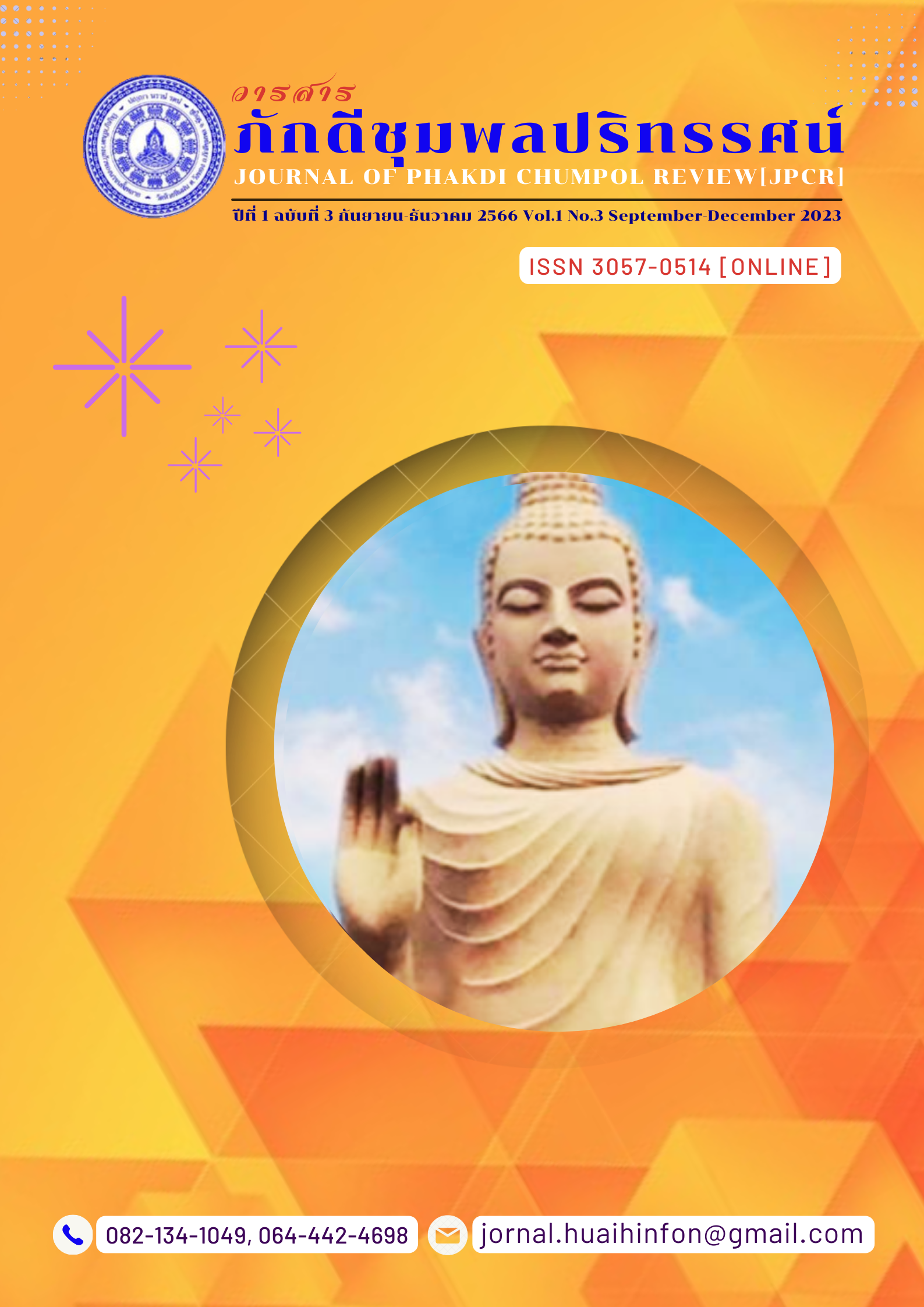Buddhist Philosophy of Life in Dhammapada Literature
Keywords:
Buddhist Philosophy, Life, Dhammapada LiteratureAbstract
This research article has two objectives: 1) to study the philosophy of life of Buddhists in Dhammapada literature, and 2) to analyze the philosophy of life in Dhammapada literature about the son of a wealthy millionaire. This research is qualitative (Qualitative Research). The results are as follows.
The results of the research found that 1) People who do not have intelligence, do not know how to accumulate wisdom (light intelligence), behave badly. And if you don't know how to find wealth when you are young, you will become stagnant like the old crane lay motionless in a quagmire with no fish, not knowing what to give. Dee had no wealth when he was young. He lay down and reached out to grab his old wealth like an arrow falling from an arrow. 2) Teachings on the Law of Karma Do good and get good. Do bad things and get bad things. Difference between good karma and bad karma the tenets of the religion are to avoid evil, do only good, and purify your mind. Teachings that emphasize personal conduct Activities that should be done Teachings on interacting with others Choosing friends and other behaviors for living together with others in society.
References
ณรงค์ เพ็ชรประเสริฐ. (2546). รานงานวิจัยฉบับสมบูรณ์ บทสังเคราะห์ภาพรวมการพัฒนาระบบสวัสดิการสำหรับคนจนและคนด้อยโอกาสในสังคมไทย. ภายใต้การสนับสนุนของสำนักงานกองทุนสนับสนุนการวิจัย (สกว.). กรุงเทพฯ: บริษัทเอดิสันเพรส โปรดักส์ จำกัด.
พระมหากฤษณะ ตรุโณ และคณะ. (2554). การวิเคราะห์การดำเนินชีวิตของคนไทยในเชิงปรัชญา. กองวิชาการ มหาวิทยาลัยมหาจุฬาลงกรณราชวิทยาลัย: ทุนอุดหนุนการวิจัย มหาวิทยาลัยมหาจุฬาลงกรณราชวิทยาลัย.
พระราชวรมุนี (ประยูร ธมฺมจิตฺโต). (2540). ปรัชญากรีก บ่อเกิดภูมิปัญญาตะวันออก. พิมพ์ครั้งที่ 3. กรุงเทพฯ: สำนักพิมพ์ศยาม บริษัทเคล็ดไทย จำกัด.
พนิดา อังจันทรเจริญ. (2548). วิถีแห่งปราชญ์ฉบับสมบูรณ์. พิมพ์ครั้งที่ 2. กรุงเทพฯ: ลิเบอร์ตี้เพรส.
พระทนงค์ศักดิ์ ปภงฺกโร (ดื่นขุนทด). (2555). การมองโลกตามหลักพุทธปรัชญา. วิทยานิพนธ์พุทธศาสตรมหาบัณฑิต, สาขาวิชาปรัชญา, บัณฑิตวิทยาลัย, มหาวิทยาลัยมหามจุฬาลงกรณราชวิทยาลัย.
พระมหาอภินันท์ อภินนฺโท. (2544). การศึกษาวิเคราะห์มัชฌิมาปฏิปทาในพุทธปรัชญาเถรวาทกับทางสายกลางของอริสโตเติล, วิทยานิพนธ์พุทธศาสตรมหาบัณฑิต, บัณฑิตวิทยาลัย, มหาจุฬาลงกรณราชวิทยาลัย.
พระมหาวิโรจน์ วิโรจโน (ผาทา). (2543). การศึกษาวิเคราะห์แนวความคิดเรื่องประโยชน์ในพุทธปรัชญาเถรวาท”. วิทยานิพนธ์พุทธศาสตรมหาบัณฑิต, บัณฑิตวิทยาลัย, มหาวิทยาลัยมหาจุฬาลงกรณราชวิทยาลัย.
ภาวนีย์ เจริญยิ่ง. (2554). ภูมิปัญญาไทย: ขุมทรัพย์แห่งแผ่นดินสยาม. กรุงเทพฯ: สำนักพิมพ์มติชน.
รุ่งนิภา เหลียง. (2563). โชเปนฮาวเออร์ข้อวิพากษ์แนวคิดแบบทุนิยม. วารสารวิชาการทางพระพุทธศาสนา. ปีที่ 6 ฉบับที่ 1 (ฉบับรวมที่ 10) ปี 2563: 80.




